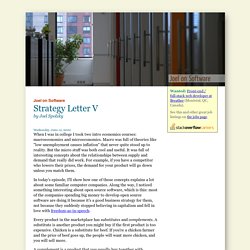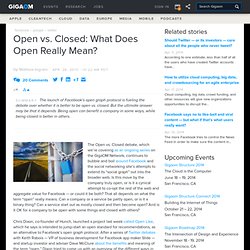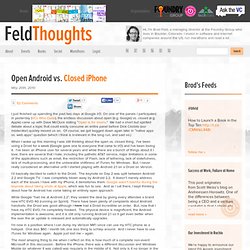

The tradeoff between open and closed cdixon.org – chris dixon's. When having the “open vs closed” debate regarding a technology platform, a number of distinctions need to be made.

First, what exactly is meant by “open.” Here’s a great chart from a paper by Harvard professor Tom Eisenmann (et al) Open Source and Economics: How the Hold Up Problem Explains the Flash Wars. Last year, when we were finalizing an academic paper tracing the history of public software institutions over the last half a century, Flash stood out as somewhat of an exception – a proprietary solution in the web development world otherwise dominated by open source.

Flash’s banishment from Apple suggests that this exceptional position may not last much longer. It also highlights one of the main drivers behind open source – the economic phenomenon known as “the hold up problem,” which is a central point in our research. The surprising aspect of open source is not its existence, but its success. People do things for free all the time. Among other things, there is no shortage of people willing to share their videos on the web. The tradeoff between open and closed cdixon.org – chris dixon's. Strategy Letter V. By Joel Spolsky Wednesday, June 12, 2002 When I was in college I took two intro economics courses: macroeconomics and microeconomics.

Macro was full of theories like "low unemployment causes inflation" that never quite stood up to reality. But the micro stuff was both cool and useful. It was full of interesting concepts about the relationships between supply and demand that really did work. In today's episode, I'll show how one of those concepts explains a lot about some familiar computer companies. Every product in the marketplace has substitutes and complements. A complement is a product that you usually buy together with another product. All else being equal, demand for a product increases when the prices of its complements decrease. Working Papers: 2006-2007 - Faculty & Research. Opening Platforms: How, When and Why? by Thomas Eisenmann, Geoff. Thomas R.

Eisenmann Harvard University - Entrepreneurial Management Unit Geoffrey Parker Tulane University - A.B. Freeman School of Business Marshall W. Boston University - Department of Management Information Systems; Massachusetts Institute of Technology (MIT) - Sloan SchoolAugust 31, 2008 This paper has been published under the same title as Chapter 6 in Platforms, Markets & Innovation (ed. Abstract: Platform-mediated networks encompass several distinct types of participants, including end users, complementors, platform providers who facilitate users' access to complements, and sponsors who develop platform technologies.
Number of Pages in PDF File: 29 Keywords: platforms, network effects, open innovation, standards, two-sided networks Accepted Paper Series Suggested Citation Eisenmann, Thomas R. and Parker, Geoffrey and Van Alstyne, Marshall W., Opening Platforms: How, When and Why? Open vs. Closed: What Does Open Really Mean? The Open vs.

Closed debate, which we’re covering as an ongoing series on the GigaOM Network, continues to bubble and boil around Facebook and the social networking site’s attempts to extend its “social graph” out into the broader web. Facebook, The App Store, And The Sound Of Inevitability. “That is the sound of inevitability…“ I’m reminded of this quote from The Matrix as I read headline after headline around the blogosphere about how Facebook and Apple and their (at least relatively) closed ecosystems are going to destroy the fabric of the web as we know it.

Investor Dave McClure: ‘Open is for losers’ What's next in mobile? Find out at MobileBeat, VentureBeat's 7th annual event on the future of mobile, on July 8-9 in San Francisco. Register now and save $400! Updated A group of investors argued heatedly about the value of open versus closed technology on a panel today at Google’s I/O conference in San Francisco. Dave McClure (pictured), who oversees the seed investing program at Founders Fund, kicked things off with a provocative statement: “Open is for losers.” McClure was answering a question from moderator Dick Costolo of Twitter, who noted that one of the big values celebrated in the tech community is openness, yet one of the hottest platforms, the iPhone, is completely controlled by Apple.
Many of the other investors on the panel immediately grumbled about McClure’s response, offering the Internet and Google as examples of successful open technologies. “I’m very afraid of a world in which we are all Steve Jobs’ slaves,” Graham said. Open Android vs. Closed iPhone. I just finished up spending the past two days at Google I/O.

On one of the panels I participated in yesterday (VCs Who Code), the endless discussion about open (e.g.